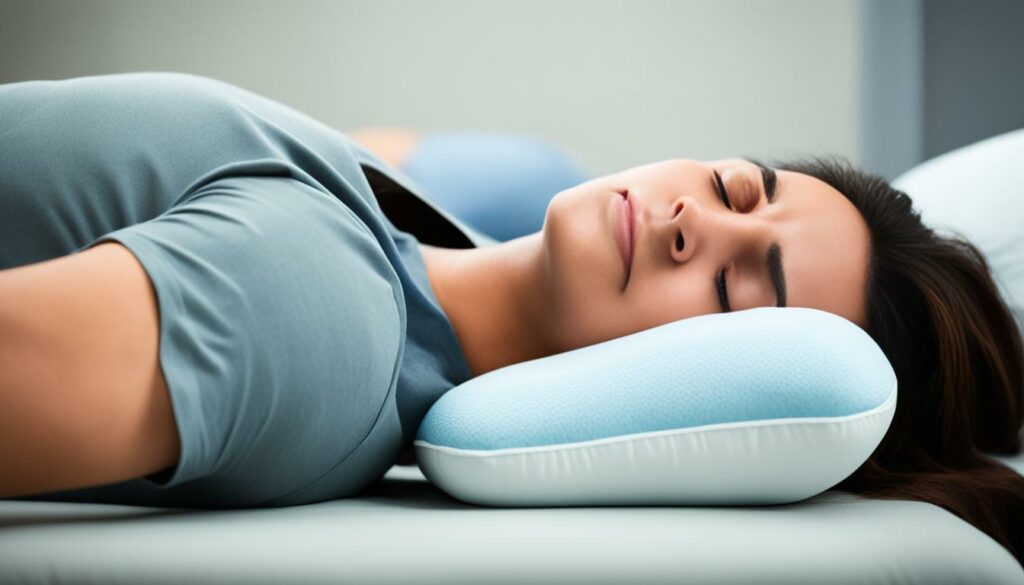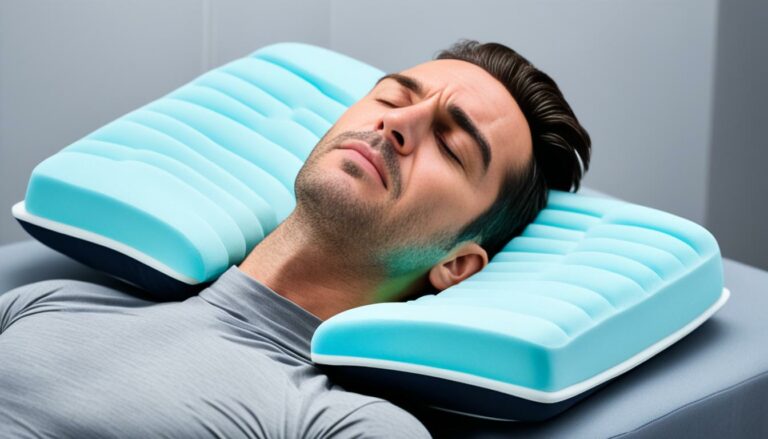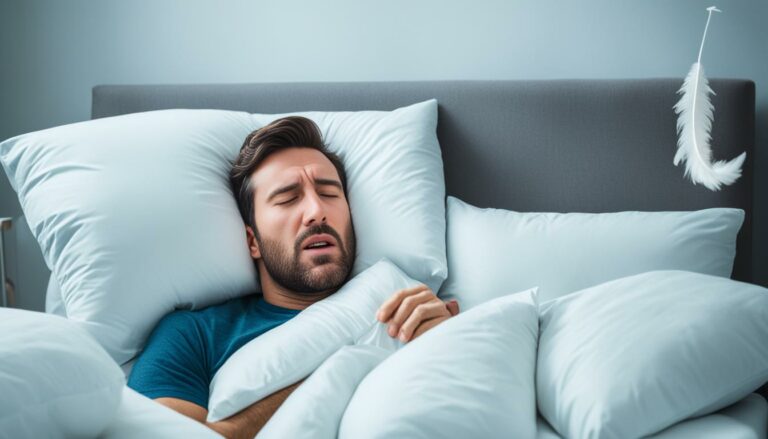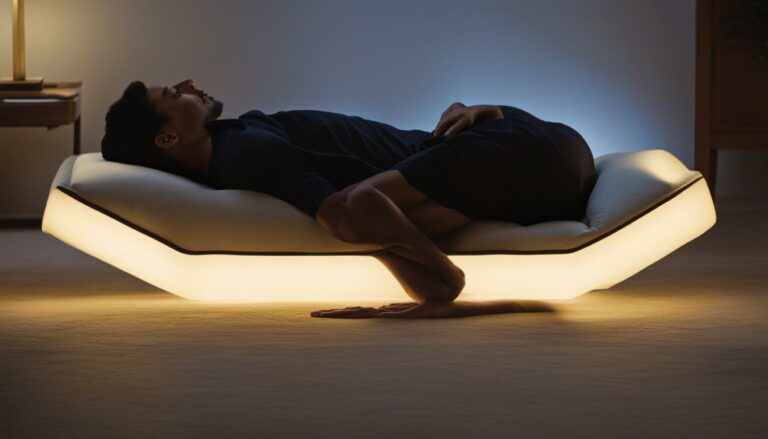Can Pillows Cause Neck Pain? Find Out Here.
Eric Christie stands as a luminary in the bedding industry, with a career spanning nearly four decades since the early 1980s. His journey through the world of bedding has seen him wear many hats – a manufacturer, designer, and retailer, showcasing his versatility and expertise in Read more...
pillowsandbedsheets.com and its partners may earn a commission if you purchase a product through one of our links
Waking up with neck pain can significantly impact your quality of life and productivity. Neck pain from sleeping can be caused by poor sleep posture, sudden movements, previous injuries, or age-related disorders. It’s essential to determine if your pillow is contributing to your neck pain. Factors like pillow height, pillow material, alignment, and lack of support can all play a role in causing neck pain.
Key Takeaways:
- Your pillow can contribute to neck pain if it lacks proper height, alignment, or support.
- Poor sleep posture can worsen neck pain, especially in the morning.
- Choosing the right pillow height and material is crucial for preventing neck pain.
- Proper alignment and support are essential for maintaining spinal health throughout the night.
- Practicing good sleep posture and considering home remedies can help alleviate neck pain.
How to Know If Your Pillow is Causing Neck Pain
Neck pain can be a real hassle to deal with, especially when it affects your ability to start your day off right. If you often wake up with neck pain that seems to worsen in the morning, it’s possible that your pillow could be the culprit.
When it comes to neck pain, pillow height and pillow material play a crucial role. If your pillow is too high or too low, it can strain the muscles and ligaments in your neck, leading to discomfort and pain. Additionally, certain materials may lack the necessary support to keep your neck properly aligned while you sleep.
To determine if your pillow is causing your neck pain, pay close attention to the following symptoms:
- Your neck pain is worse in the morning than at other times of the day.
- You experience discomfort or stiffness in your neck when you wake up.
- Your neck feels strained or tense throughout the day.
If you identify with any of these symptoms, it’s time to assess your pillow’s impact on your neck health. Ensure that your pillow adequately supports your head and neck, providing proper alignment with the rest of your body. This will help to alleviate morning neck pain and improve your overall sleep quality.
What to Look for in a Pillow
When selecting a pillow that promotes optimal sleep posture and prevents neck pain, consider the following factors:
- Pillow Height: Choose a pillow height that keeps your neck in a neutral position in relation to the rest of your spine. The ideal height varies depending on your sleeping position, so be sure to find the right fit for you.
- Pillow Material: Opt for a pillow made of materials that offer adequate support and conform to the natural curves of your head and neck. Memory foam and latex foam are popular options.
By finding the right pillow that aligns with your individual needs, you can prevent neck pain and enjoy a restful night’s sleep.
Pillow Height and Neck Pain
Choosing the right pillow height is essential for preventing neck pain and ensuring proper alignment while sleeping. Incorrect pillow height can strain the muscles and ligaments in your neck, leading to discomfort and stiffness.
The ideal pillow height varies depending on your sleeping position. Here’s a guide to help you find the right pillow height:
Side Sleepers:
For those who sleep on their side, a thicker pillow is recommended to fill the space between the head and shoulder. This helps maintain proper alignment and prevents the neck from bending too much.
Back and Stomach Sleepers:
If you sleep on your back or stomach, a thinner pillow is preferable. This allows your head and neck to rest in a neutral position, preventing excessive strain on the neck muscles. Back sleepers might also benefit from using a pillow that supports the natural curve of their spine.
In addition to your sleeping position, the firmness of your mattress should also be taken into consideration when determining the ideal pillow height. Softer mattresses may require a slightly higher pillow, while firmer mattresses generally require a slightly lower pillow to maintain proper spinal alignment.
Remember, finding the right pillow height not only helps prevent neck pain but also contributes to a more comfortable and restful sleep. Experimenting with different pillow heights and evaluating how your neck feels after waking up can guide you in selecting the perfect pillow for your needs.
| Sleeping Position | Ideal Pillow Height |
|---|---|
| Side Sleeper | Thicker pillow to support the head and fill space between head and shoulder |
| Back Sleeper | Thinner pillow to maintain natural spinal alignment |
| Stomach Sleeper | Thin, flat pillow to minimize strain on the neck |
Remember, the right pillow height is crucial for preventing neck pain, ensuring proper alignment, and achieving a good night’s sleep. Don’t underestimate the impact your pillow can have on your neck health and overall well-being.
Pillow Material and Neck Pain
The material of your pillow plays a significant role in neck pain. It’s important to choose a pillow material that provides the right balance of comfort and support to prevent neck pain. According to a chiropractor, foam contour pillows are considered the best choice for most people as they offer excellent conformity to the neck’s curvature, promoting proper alignment.

When it comes to pillow materials, there are a few options to consider:
- Latex Foam: Latex foam is highly recommended as the best material for a cervical contour pillow. It offers exceptional support and conformability, ensuring proper alignment and relieving pressure points.
- Memory Foam: Memory foam pillows can be a suitable alternative to latex foam. They contour to the shape of your head and neck, providing personalized support and comfort.
- Buckwheat and Mixed Fillers: Pillows filled with buckwheat or a mix of various materials can be acceptable options, but they may be less reliable in terms of support and durability.
- Feather and Down: Feather and down fillings can provide adequate alignment and support. However, they may require regular fluffing and replacement to maintain their shape and effectiveness.
Remember, finding the right pillow material is a personal preference, and what works for one person may not work for another. It’s essential to try different materials and consider your specific needs and sleeping habits to find the most suitable pillow material for preventing neck pain.
Alignment and Neck Pain
Proper alignment is crucial for preventing neck pain, especially when it comes to the role of pillows. Regardless of your sleeping position, your neck should be parallel to the mattress, and your shoulders should align with your hips. Maintaining proper alignment while you sleep can greatly reduce the chances of waking up with discomfort and stiffness in your neck.
If you’re a side sleeper, using a pillow between your legs can help achieve better alignment. This placement helps to keep your spine straight and evenly distributed. Placing a pillow under your top arm can also provide support and prevent your upper shoulder from rotating forward, helping to maintain alignment in your neck and shoulders.

If you prefer sleeping on your back, placing a pillow under your knees can help align your spine. This position reduces strain on your lower back and prevents excess pressure on your neck. The pillow should not be too bulky; a thinner pillow that properly supports the neck curve is ideal. A cervical roll pillow or a contoured pillow can provide the necessary support for your neck.
To ensure proper alignment, it’s also important to sleep on a mattress that supports spinal alignment. A mattress that is too firm or too soft can disrupt proper alignment and potentially contribute to neck pain. Consider investing in a mattress that provides adequate support for your body and promotes a neutral spine position.
Lack of Support and Neck Pain
Inadequate support from a pillow can be a significant factor in causing neck pain. When your pillow lacks proper support, it fails to maintain the natural alignment of your head and neck, leading to discomfort and stiffness. This can particularly affect side and back sleepers who require additional support to keep their spine properly aligned during sleep.
One way to address this issue is by using a pillow that is higher under the neck than the head. This design helps provide better alignment and support for the spine. A popular choice for this purpose is a cervical contour pillow. This pillow is specifically designed to cradle the head and support the natural curve of the neck, preventing strain and tension.

Another option for achieving adequate support is using pillows with shiftable filling. These pillows allow you to customize the support based on your preference and sleeping position. By adjusting the pillow’s filling, you can ensure that it provides optimum support to your neck and spine, reducing the risk of neck pain.
For back sleepers, memory foam pillows can be a suitable choice. Memory foam contours to the shape of your neck, providing customized support while maintaining proper alignment. The material also offers pressure relief, minimizing the risk of developing discomfort during the night.
Comparison of Pillow Types for Support
| Pillow Type | Benefits | Recommended Sleeping Position |
|---|---|---|
| Cervical Contour Pillow | – Supports natural neck curvature – Cradles the head – Promotes proper spinal alignment |
Side and back sleepers |
| Pillows with Shiftable Filling | – Customizable support – Adjustable for different sleeping positions |
Side and back sleepers |
| Memory Foam Pillow | – Conforms to neck shape – Provides targeted support – Pressure relief |
Back sleepers |
Choosing a pillow that offers adequate support is crucial for preventing neck pain. Consider your sleeping position and personal preferences when selecting a pillow. Remember, the right support can make a significant difference in your sleep quality and overall neck health.
Sleeping Positions and Neck Pain
Your sleeping position plays a significant role in preventing neck pain from pillows. Back and side sleeping are generally better for neck health compared to stomach sleeping.
Side sleepers need a contoured pillow that supports the head and neck. This type of pillow helps maintain proper alignment and reduces strain on the neck. The contour design cradles the neck and keeps it in a neutral position throughout the night.
Back sleepers benefit from a lower-profile pillow that maintains the natural curvature of the spine. This allows for proper alignment of the neck and helps prevent excessive flexion or extension. Look for a pillow that supports the curve of your neck without lifting your head too high.
Stomach sleepers should consider changing their sleeping position since it can put additional stress on the neck. However, if you can’t break the habit, using a thin, flat pillow is recommended. This helps minimize strain on the neck and keeps the spine aligned as much as possible.

Remember, your pillow should support your sleeping position and promote proper alignment of your head, neck, and spine. Finding the right pillow that works for you can make a significant difference in preventing neck pain.
How to Prevent Neck Pain From Your Pillow
In addition to choosing the right pillow, practicing proper sleep posture is crucial for avoiding neck pain. Experiment with different pillow sizes and types to find the best support for your sleeping position. Regularly fluff and maintain your pillow according to the manufacturer’s instructions. Consider replacing pillows that do not provide enough support or have a short lifespan. Focus on maintaining spinal alignment and proper posture throughout the day as well.
Tips for Preventing Neck Pain from Pillows:
- Choose the right pillow size and type that suits your sleeping position and neck support needs.
- Regularly fluff and maintain your pillow to ensure optimal comfort and support.
- Follow the manufacturer’s instructions for cleaning and care to prolong the lifespan of your pillow.
- If your pillow no longer provides adequate support, consider replacing it with a new one.
- Focus on maintaining proper spinal alignment and posture throughout the day to support your neck.
“Choosing the right pillow and practicing good sleep posture are essential for preventing neck pain.” – Sleep Expert
By paying attention to the size, type, and maintenance of your pillow, as well as prioritizing proper posture, you can significantly reduce the risk of neck pain and achieve a more comfortable and restful sleep.
| Pillow Types | Pros | Cons |
|---|---|---|
| Memory Foam | Conforms to the shape of your head and neck, provides excellent support | May retain heat, some may find it too firm |
| Feather/Down | Soft and luxurious feel, adjustable loft | May lose shape over time, potential allergen for some individuals |
| Latex | Firm and supportive, hypoallergenic | Can be expensive, may have a distinctive odor |
| Buckwheat | Adjustable, conforms to your head and neck | Can be noisy, some may find it too firm |
Remember, finding the right pillow is a personal journey. Consider your preferences, sleeping position, and any specific neck support needs when choosing the perfect pillow for a pain-free slumber.
Home Remedies for Neck Pain
If you wake up with neck pain from pillows, there are home remedies you can try to alleviate the discomfort. Here are some simple yet effective methods:
Apply Cold or Heat Packs
Applying cold or heat packs to the sore area can help reduce inflammation and soothe the muscles in your neck. If you’re experiencing acute pain, apply a cold pack wrapped in a cloth for 15-20 minutes. For chronic pain, you can use a heat pack or a warm towel to relax the muscles.
Take Over-the-Counter Painkillers
Over-the-counter pain medications, such as ibuprofen or acetaminophen, can provide temporary relief from neck pain. However, it’s important to follow the dosage instructions and consult with a healthcare professional if you have any underlying conditions or are taking other medications.
Engage in Gentle Exercises
Gentle exercises like walking or practicing yoga can help improve blood flow to the neck and promote muscle relaxation. Focus on gentle stretches that target the neck and shoulder area to relieve tension and strengthen the supporting muscles.
“Applying cold or heat packs, taking over-the-counter painkillers, and engaging in gentle exercises can provide relief from neck pain.”
Remember, these home remedies are not meant to replace professional medical advice. If your neck pain persists or worsens, it’s important to consult with a healthcare professional for a proper diagnosis and treatment plan.
Applying cold or heat packs, taking over-the-counter painkillers, and engaging in gentle exercises can provide relief from neck pain caused by pillows. It’s important to listen to your body and find what works best for you in managing your neck pain.
When to Seek Medical Help for Neck Pain
In most cases, neck pain can be managed at home through proper pillow selection and sleep posture. However, if your neck pain persists or worsens despite these measures, it may be necessary to seek medical help. The following symptoms should prompt you to consult a healthcare professional:
- Fever: If you experience a fever along with neck pain, it could indicate an underlying infection or inflammation that requires medical attention.
- Headache: Severe headaches accompanying neck pain may indicate a more serious condition, such as a cervical spine issue, and should be evaluated by a healthcare professional.
- Difficulty swallowing: If you have difficulty swallowing, it could be a sign of nerve involvement or an underlying structural problem in the neck, which should be assessed by a medical expert.
- Numbness and tingling in the limbs: These symptoms may suggest nerve compression or damage, warranting immediate medical evaluation to prevent long-term complications.
Remember, while proper pillow selection and sleep posture can help prevent neck pain, it is important to recognize when medical intervention is necessary for effective management and treatment.
FAQ
Can pillows cause neck pain?
Yes, pillows can cause neck pain if they do not provide proper support or alignment. Factors like pillow height, material, and lack of support can contribute to neck pain.
How can I know if my pillow is causing neck pain?
If you wake up with neck pain that is worse in the morning or if you experience discomfort while sleeping, your pillow may be the culprit. Assess factors like pillow height and material to determine if they are contributing to your neck pain.
How does pillow height affect neck pain?
Pillow height is crucial for proper alignment while sleeping. If your pillow is too high or too low, it can strain the muscles and ligaments in your neck, leading to pain. The ideal pillow height varies based on your sleeping position.
How does pillow material affect neck pain?
The material of your pillow can impact neck pain. Foam contour pillows, specifically made to conform to the neck’s curvature, are recommended for most people. Latex foam is considered the best material for a cervical contour pillow, although memory foam can be a suitable alternative. Other materials like buckwheat and mixed fillers can be acceptable but may be less reliable. Feather and down fillings can provide adequate alignment and support but need to be replaced regularly.
How does alignment impact neck pain?
Proper alignment is essential for preventing neck pain. Your neck should be parallel to the mattress and your shoulders should align with your hips. Using additional pillows under your top arm and between your legs (if you’re a side sleeper) or below your knees (if you’re a back sleeper) can help achieve better alignment. A mattress that supports proper spinal alignment is also important.
How does lack of support contribute to neck pain?
Inadequate support from a pillow can contribute to neck pain. For side and back sleepers, a pillow that is higher under the neck than the head can provide better alignment and support for the spine. Cervical contour pillows are designed for this purpose, but pillows with shiftable filling can also achieve the same goal. Memory foam pillows can provide adequate support for back sleepers.
How do different sleeping positions affect neck pain?
Your sleeping position plays a significant role in neck pain. Back and side sleeping are generally better for neck health compared to stomach sleeping. Side sleepers need a contoured pillow that supports the head and neck. Back sleepers benefit from a lower-profile pillow that maintains the natural curvature of the spine. Stomach sleepers should consider changing their sleeping position, but if they can’t, using a thin, flat pillow is recommended.
How can I prevent neck pain from my pillow?
To prevent neck pain from your pillow, choose the right pillow that provides adequate support and alignment for your sleeping position. Experiment with different pillow sizes and types to find the best fit. Regularly fluff and maintain your pillow according to the manufacturer’s instructions. Consider replacing pillows that do not provide enough support or have a short lifespan. Focus on maintaining spinal alignment and proper posture throughout the day as well.
Are there any home remedies for neck pain?
If you wake up with neck pain, you can try home remedies to alleviate discomfort. Apply cold or heat packs to the sore area, take over-the-counter painkillers, and engage in gentle exercises like walking or yoga. These measures can help reduce inflammation, soothe muscles, and improve blood flow to the neck.
When should I seek medical help for neck pain?
In most cases, neck pain can be managed at home. However, if the pain persists or worsens, it may be necessary to seek medical help. Certain symptoms, such as fever, headache, difficulty swallowing, or numbness and tingling in the limbs, may indicate a more serious underlying condition and require immediate medical attention.
Eric Christie stands as a luminary in the bedding industry, with a career spanning nearly four decades since the early 1980s. His journey through the world of bedding has seen him wear many hats – a manufacturer, designer, and retailer, showcasing his versatility and expertise in Read more...







